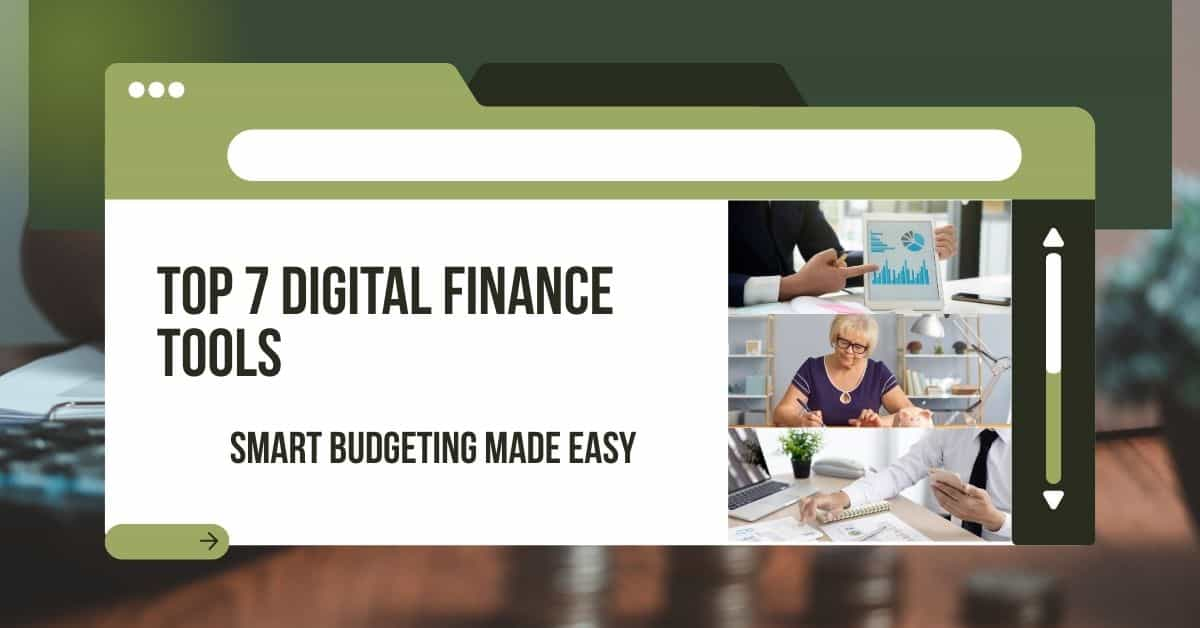Top 7 Digital Finance Tools: Understanding budgeting is crucial for beginners hoping to attain financial stability in the fast-paced financial environment of 2025 India, where inflation is predicted to be around 3.1% annually and urban living expenses in major cities like Bengaluru and Mumbai average ₹28,000–82,000 per month for singles and families, respectively. Since young professionals frequently struggle with entry-level incomes of ₹3–8 lakh per year and household debt in India reached 41.9% of GDP as of December 2024, digital finance solutions have become essential for streamlining budgeting, monitoring spending, and encouraging wise saving practices. In addition to helping users manage their everyday expenses, these applications offer AI-driven insights to prevent excessive spending, integrate with UPI for smooth tracking, and support long-term objectives like saving for emergencies or investing in SIPs.
With an emphasis on India-specific apps that address regional requirements like tracking UPI transactions, bills that include GST, and investments denominated in rupees, this comprehensive list outlines the top 7 digital finance tools to make budgeting easier for novices in 2025. We will examine the features, benefits, drawbacks, user ratings (as of September 2025 from the Google Play/App Store), and how each program makes budgeting simple, based on user data and recent evaluations from sites like Decentro, Moneyview, and Forbes Advisor. Let’s get started and make your budgeting process easier!
The Importance of Digital Finance Tools for Indian Budgeting in 2025
According to Scripbox and Numbeo data, urban living expenses in metro areas like Mumbai average ₹82,000/month for families (not including rent) and ₹28,000 for single people in Bengaluru, making budgeting more important than ever in 2025. According to RBI estimates, traditional pen-and-paper systems are inadequate for tracking auto-debits for subscriptions or UPI payments, which account for over 80% of transactions in India. This results in overspending by 15% to 25%. With AI-powered classification, real-time alerts, and bank account connectivity, digital finance products enable consumers close this gap and save 20–30% on monthly spending while also supporting objectives like emergency savings or systematic investing plans. These apps, which simplify budgeting and give features like goal trackers, investment links, and bill reminders, are essential for beginners dealing with economic constraints like 3.1% inflation expectations in a year where digital payments reached all-time highs (UPI transactions up 40% YoY).
Comprehensive Reviews and Features of the Top 7 Digital Finance Tools for Budgeting in 2025
These are the top 7 tools, chosen for their ease of use, India-specific features (such as rupee monitoring and UPI integration), ratings (4.5+ on Google Play/App Store with 1M+ downloads), and beginner focus, based on 2025 updates from Decentro, Moneyview, and Forbes Advisor.
1. Moneyview: The Greatest for Detailed Cost Monitoring and Loans

With 4.6 reviews and more than 50 million downloads, Moneyview is a great option for new users in India. It offers integrated personal loans (up to ₹5 lakh at 1.33% monthly interest), bill reminders, and automatic classification of SMS and UPI transactions. Features include credit score tracking, goal trackers for savings, and AI insights into spending trends. Advantages: Free, easy loans, India-focused, with UPI synchronisation. Cons: Limited investment links and free version advertisements. Perfect for: Freshers monitoring salary expenditures (saving 15–20% by identifying leakage, such as ₹2,000 per month on meal deliveries).
2. Goodbudget: Discipline-Based Envelope-Style Budgeting
Digital envelopes are used to distribute money (e.g., ₹10,000 for rent, ₹5,000 for enjoyment) on Goodbudget (4.5 rating, 1M+ downloads), which syncs across devices for families or couples. Features include trend reports, a free basic version, and manual entry for thoughtful spending. Advantages: Does not require a bank connection and teaches the basics of budgeting. Cons: No auto-tracking; unlimited envelopes cost $6/month. Perfect for: beginners learning self-control (e.g., restricting meals to ₹3,000/month).
3. Walnut: Automated Tracking via SMS for Stress-Free Budgeting
Walnut (4.4 rating, 5M+ downloads) offers credit card management, bill reminders, and real-time spending classification by parsing bank SMS. Features include loan monitors, split bills, and AI classification. Advantages: Free, safe (no bank login required), and UPI-optimized for India. Cons: Basic reporting and reliance on SMS (may miss some). Perfect for: Busy new hires (automatically tracks 4,000 in transport expenses).
4. ET Money: Combining Investments and Budgeting
ET Money (4.7 rating, 10M+ downloads) offers spending trackers connected to SIPs and integrates mutual fund investments with budgeting. Features include a tax optimiser, goal-based budgeting, and automatic import from banks. Advantages include free direct mutual funds and useful analytics. Cons: App bugs have been mentioned; investment-focused (less pure budgeting). Perfect for: Beginners setting aside money for objectives (e.g., ₹1.5 lakh 80C via ELSS).
5. Groww: Using Seamless Investing to Budget
Groww (4.6 rating, 50M+ downloads) offers UPI integration for purchases in addition to stock and mutual fund investing and spending management. Features include a portfolio tracker and bill payments with prizes. Benefits include ease of use and no stock broking. Cons: Emphasis on investing and limited budgetary depth. Perfect for: Beginners with an interest in stocks (SIPs should have a monthly budget of ₹5,000).
6. Paytm Money: A Comprehensive Financial Centre for Budgeting
Investing links, bill reminders, and expense classification are all provided by Paytm Money (4.5 rating, 20M+ downloads). Features: UPI auto-track, mutual fund SIPs, credit score. Benefits include connected wallets and bill cashback. Cons: Occasional latency and privacy issues. Perfect for: Users who use UPI frequently (get 10% bill cashback).
7. CRED: Credit Users’ Reward-Focused Budgeting
Credit card spending is tracked by CRED (4.4 rating, 10M+ downloads), which also provides incentives for on-time payments. Features include cost analytics, rewards (₹100–500/month), and bill reminders. Positives: Credit boost, enjoyable prizes (free coupons). Cons: Premium features are paid for; credit cards are not for cash users. Perfect for: Cardholders who want to save ₹2,000 annually on incentives.
Table of Comparisons: The Best 7 Digital Finance Tools for 2025 Budgeting
| Tool | Key Features | Pros | Cons | Rating (Google Play) | Best for Beginners |
| Moneyview | Auto-categorization, loans, credit score | Free, UPI sync, insights | Ads | 4.6 (50M+ downloads) | Comprehensive tracking |
| Goodbudget | Envelope system, reports | Teaches discipline, free basic | No auto-track | 4.5 (1M+) | Goal-based budgeting |
| Walnut | SMS parsing, splits | Effortless, secure | Basic reports | 4.4 (5M+) | Auto-expense logging |
| ET Money | Budget + investment, tax optimizer | Analytics, direct funds | Investment-heavy | 4.7 (10M+) | Goal-oriented savers |
| Groww | Expense + stocks, zero brokerage | User-friendly | Less budgeting depth | 4.6 (50M+) | Investment beginners |
| Paytm Money | UPI track, SIPs, score | Cashback, wallet | Lags | 4.5 (20M+) | UPI users |
| CRED | Rewards on bills, analytics | Fun incentives | Card-focused | 4.4 (10M+) | Credit card holders |
Advice for Selecting and Making Use of Digital Finance Tools in 2025 for Budgeting
- Start Easy: For ease of use, beginners choose Moneyview or Goodbudget; for investments, more experienced users choose ET Money.
- Privacy First: Prioritise privacy by making sure apps have read-only access and bank-grade encryption.
- Connect with Life: Set up warnings for overspending and sync with banks and UPI for auto-tracking.
- Combine Tools: CRED for awards, Goodbudget for envelopes.
- Review Frequently: Make a monthly check and account for inflation (3.1% predicted for 2025).
Common Mistakes Beginners Make When Using Budgeting Tools and How to Prevent Them
- Over-Reliance on Auto-Track: Errors can be avoided with manual review.
- Ignoring Premium Features: At first, free versions are adequate.
- Not Setting Goals: Get motivated by using the trackers in applications.
- Privacy Oversights: Verify authorisation; refrain from disclosing private information.
- Leaving After Setup: Regular use produces outcomes.
Frequently Asked Questions (FAQs)
Which budgeting apps are the greatest for beginners in India in 2025?
Moneyview for monitoring, Good envelope budget, For auto-SMS, walnut ET funds for investments, Grown for stock Use CRED for prizes and Paytm Money for UPI.
Are these tools for digital finance free?
The majority provide basic functionality in free editions, while more extensive analytics are available with subscription upgrades (₹100–500/month).
How can Indian taxpayers save money on taxes using budgeting apps?
Keep tabs on 80C claim costs, such as insurance premiums; some incorporate tax optimisers, such as ET Money.
Which personal financial app is the best for tracking expenses in India in 2025?
For thorough tracking, use Moneyview; for the envelope technique, use Goodbudget.
Can investment planning be aided by these tools?
Indeed, Groww and ET Money connect mutual funds and SIPs to budgeting.
Conclusion
Moneyview, Goodbudget, Walnut, ET Money, Groww, Paytm Money, and CRED are the best 7 digital finance apps for beginners in 2025 that make budgeting easier. They provide effective ways to monitor, save, and grow money in India’s changing economy. They make finance management easy and enjoyable with features like AI insights, UPI integration, and awards. Your wallet will appreciate it if you start with one now to revolutionise your budgeting! What tool are you going to test first? Leave a comment below!
Disclaimer: This article is only meant to provide information. Consult financial advisors for personalised advice.
Urban Company IPO Dreams? Here’s How Smart Smart Budgeting Can Make It Possible!
Young and Ambitious? Master Your Money with These Easy Steps!
Cian Agro Share Price: Today’s Live Update & Market Trend

I’m Rashid Ali, a personal finance blogger and content creator at SavingSecret.in, helping young adults in India master saving, investing, and tax planning. I simplify money topics like budgeting, IPO updates, and stock market tips to make finance easy and actionable. Follow me for smart money moves that actually work!
